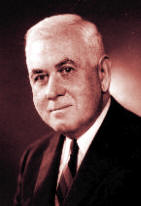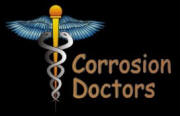Francis L. LaQue (1904-1988)
Francis L. LaQue died at his home in Kingston, Ontario, on January 19, 1988, at age eighty-three. He was a world renowned authority on marine corrosion, an outstanding author and lecturer, a prominent business executive, and a consultant and adviser to government.

The recipient of many honors and awards, he served as president of the Electrochemical Society from 1962 to 1963, of the American Society for Testing Materials in 1959, and of the National Association of Corrosion Engineers in 1948. He was always known as Frank LaQue.
While a U.S. citizen through most of his professional career, he later returned to Canadian citizenship and was elected to the National Academy of Engineering in 1985 as a foreign associate.
Frank LaQue was born in Gananoque, Ontario, and attended schools there. Being a child when his father died, Frank knew the extra work and responsibility required to help his mother Agnes Mary (O'Neil) and his sister, Mary, maintain the family. In school he liked both academics and hockey and did well in both, thus demonstrating his lifelong characteristics of high standards, dedicated application, and personal enjoyment. His excellent school record helped him into Queen's University in nearby Kingston, Ontario, where he graduated in 1927 with a degree in chemical and metallurgical engineering. After graduating he worked for several months at Deloro Smelting and Refining Company of Canada as a foreman in charge of refining cobalt oxide. Soon, however, he was contacted by the International Nickel Company of Canada, Ltd., commonly known as INCO, and for eleven years was assistant director of technical services. In 1938 he was promoted to the Development and Research Division. In 1940 he was placed in charge of the Corrosion Engineering Section. In 1945 he became vice-president and manager of the Development and Research Division. In 1954 he became vice-president in charge of the Executive Department, and from 1952 to his retirement in 1969, he was a special assistant to the president. Hence, in his fortytwo-year career with INCO Frank became well acquainted with many aspects of the research, manufacturing, and usage of materials exposed to the elements.
Perhaps one of Frank's greatest achievements was to establish at Kure Beach and Wrightsville Beach, North Carolina, a large and effective marine corrosion test site. This major effort began around 1935 when Frank received permission to immerse alloy test specimens in the canal supplying ocean water to the bromine extraction plant of the EthylDow Chemical Company. The test site was soon enlarged to include an area along the beach for testing exposure to marine atmospheres. Eventually, permanent buildings were erected at nearby Wrightsville Beach. The new facility made it possible to house thousands of test specimens, and evaluate corrosion resistance performance of entire engineering installations such as those used for desalination, distillation, and condensing. Results of the various tests were of interest to many engineers and scientists. Accordingly, from the very start Frank arranged an annual inspection and review of the specimens, including presenting his interpretation of the results and inviting others to express their opinions. Employing his unusual wit and tact, he expertly guided divisive opinions to reasonable accord. These popular sessions, attended by several hundred participants, became known as the Sea Horse Institute. They continue today, under the direction of W. W. Kirk, at the same site that is now officially entitled "The LaQue Center for Corrosion Technology."
Thirty-seven years after receiving his B.Sc. in metallurgy from Queen's University, it conferred on him the honorary doctor of laws degree. He served on the visiting committees of the Department of Metallurgy at the Massachusetts Institute of Technology, Case Institute of Technology, Division of Electrochemistry at the University of Pennsylvania, and National Bureau of Standards. Frank was very active in professional groups that were concerned with corrosion. His participation in such groups included being chairman of the Corrosion Research Council from 1959 to 1960; president of the Electrochemical Society in 1962 and of the National Association of Corrosion Engineers in 1949; fellow of the American Society for Metals; vice-chairman of the Welding Research Council; and a member of the Society of Automotive Engineers, the Society of Naval Architects and Marine Engineers, and the American Chemical Society.
After retirement from INCO Frank found time to accept invitations worldwide to present lectures on corrosion and to conduct special courses on marine corrosion at Scripps Institution of Oceanography at La Jolla, California, from 1970 to 1976 and at the University of Hawaii. He served on the board of the International Oceanographic Foundation. Over the years he inspired, advised, and informed many students engaged in corrosion studies and he unstintingly helped numerous engineers concerned with corrosion problems.
In describing the state of our knowledge of corrosion, Frank once stated, "the degree of experience one has with corrosion often determines his opinion of it. Neophytes may believe they understand the corrosion problems they have observed and feel capable of dealing with any similar future recurrences. Experts may suggest rational explanations for apparently anomalous behavior and thus view corrosion as a reasonably orderly phenomenon. But corrosion engineers, like economists, know enough to provide plausible explanations of what has happened without being equally adept at predicting future occurrences."
Frank also spent a very large part of his corporate and retired career improving engineering standards. As with corrosion, his interest was both national and international. He belonged to many engineering standard organizations, did more than normal homework, and became president of several including the American National Standards Institute (ANSI) from 1969 to 1971 and the American Society for Testing Materials (ASTM) from 1959 to 1960. In 1974 he served in Washington as deputy assistant secretary of the U.S. Department of Commerce concerned with industrial standards.
Frank was the 1976 recipient of ANSI's Astin-Polk International Standards Medal that appropriately stated his contributions.
No American has held offices of higher responsibility in international and national standardization or discharged those responsibilities with more statesmanlike diplomacy or greater vision and wisdom. As president of the International Organization for Standardization, the American National Standards Institute, and ASTM, vice-president of the Pan American Standards Commission, and deputy assistant secretary of commerce for product standards, he worked tirelessly to ensure that standardization programs met the needs of all sectors of society_ The wide support he achieved for voluntary standardization and the long range planning he helped institute will assist national and international organizations to continue to make lasting contributions to the worldwide exchange of technology and the well-being of people everywhere.
Frank received other special professional recognitions including the Frank Newman Speller Award in 1949 from the National Association of Corrosion Engineers, the Howard Coonley Medal in 1962 from the American National Standards Institute, the Edward G. Acheson Medal in 1968 from the Electrochemical Society, the Leo B. Moore Medal from the Standards Engineering Society, the Arch T. Colwell Cooperative Engineering Medal from the Society of Automotive Engineers, and honorary membership in the American National Standards Institute.
Frank's special publications included the Edgar Marburg Lecture on Corrosion Testing, Proceedings ASTM, Vol. 51, 1951; coauthor with H.R. Copson, Monograph 158, Corrosion Resistance of Metals and Alloys, Reinhold Publishing Co., New York, 1963; Marine Corrosion, The Electrochemical Society Monograph Series, John Wiley and Sons, New York, 1975; and the narrative and production of the motion picture Corrosion in Action, International Nickel Co., 1955.
Many people will remember and benefit from what Frank LaQue accomplished.
However, those who were fortunate enough to know him and work with him may be
most apt to remember him for his good humor and forceful, interesting, and effective
style; his ability to gracefully shift from dead seriousness to puckish humor;
and his intolerance for those who tried to deflect a serious discussion and
his helpful tolerance for the serious learner.
Francis Lawrence LaQue influenced
to our benefit several professional areas covered by his diversified interests.
As a respected, concerned person, generous in all respects, he upgraded life
in the community in which all of us live.

Connect with us
Contact us today